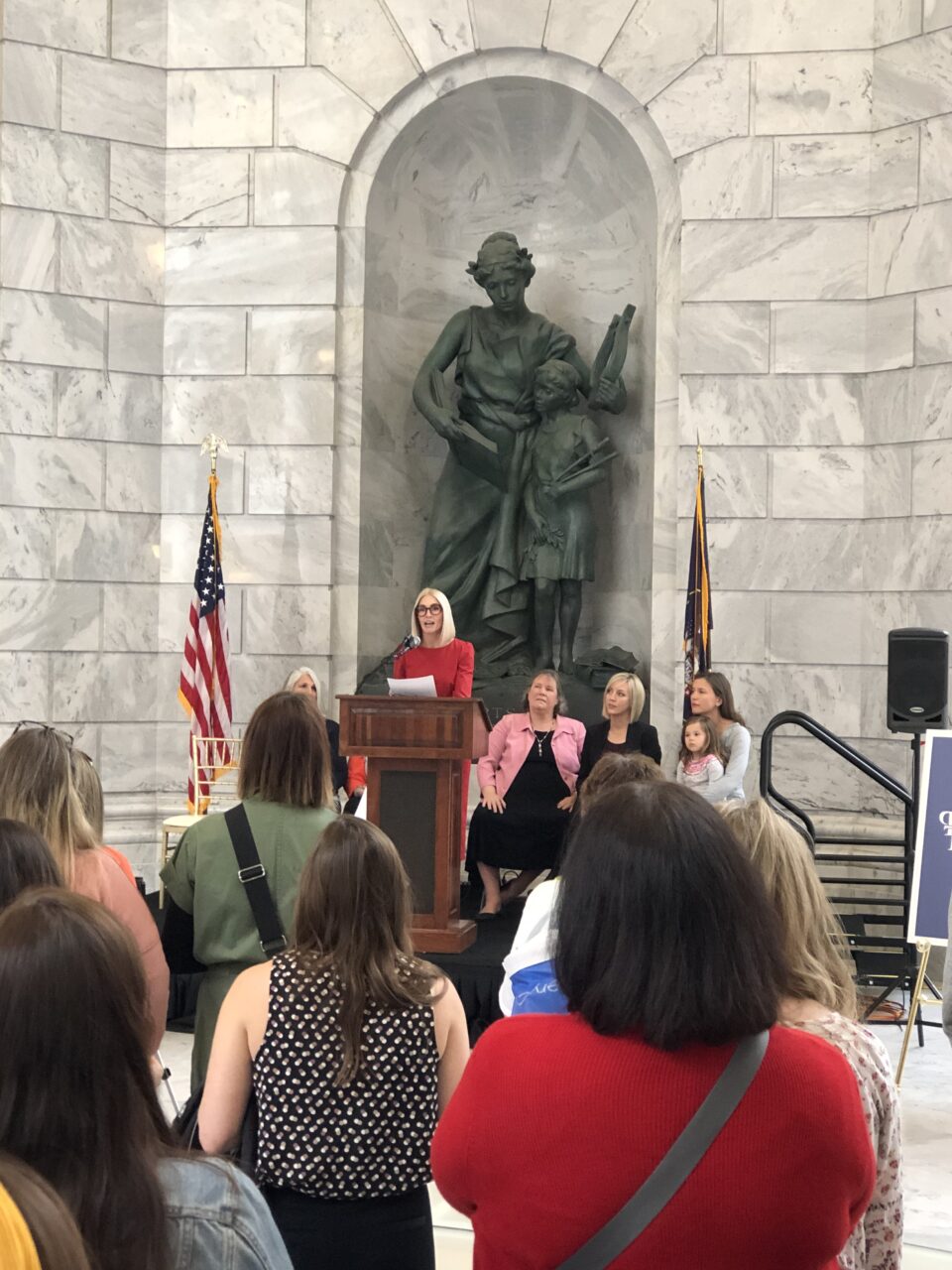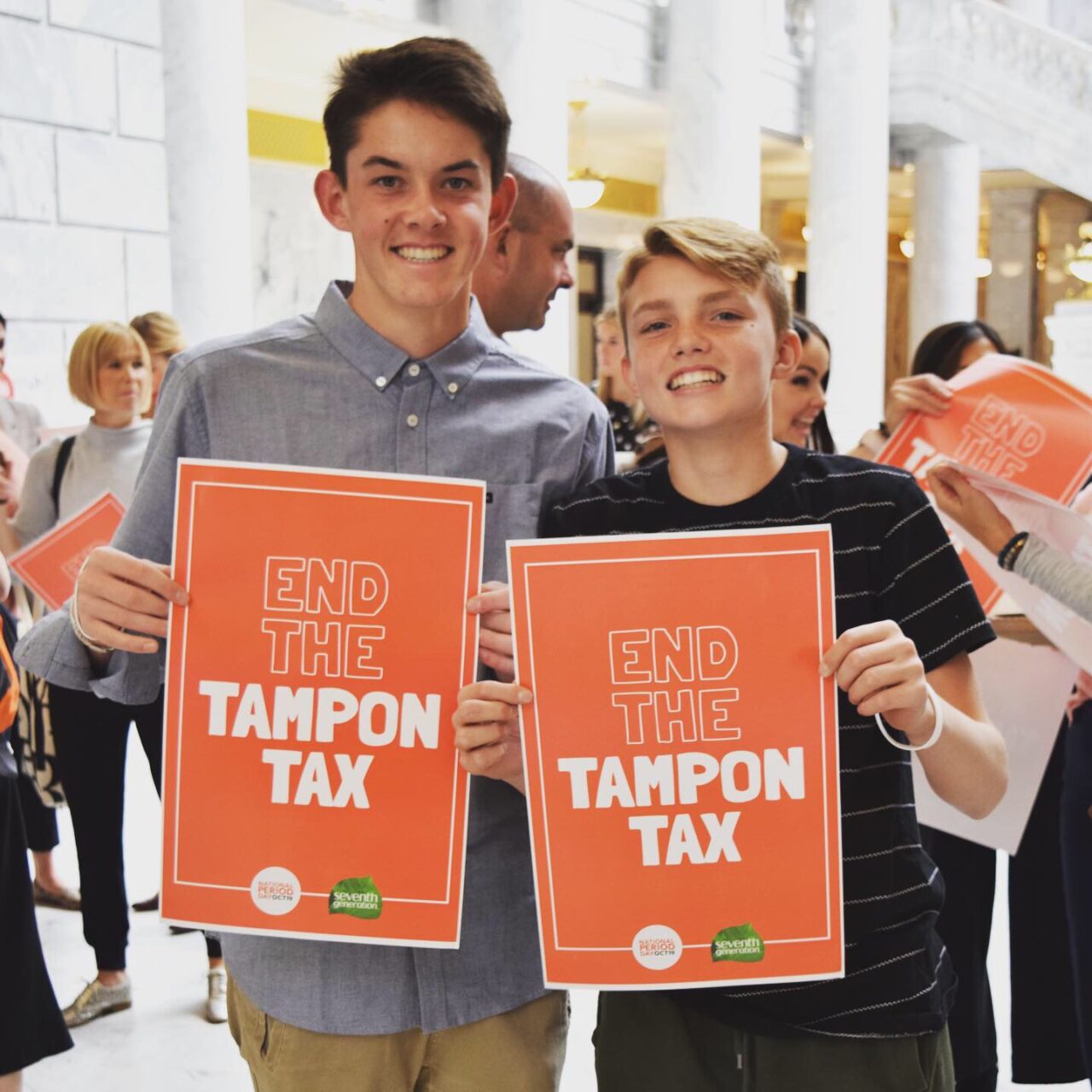
The Policy Project has organized a rally for Nov. 17 at the Utah State Capitol. Emily Bell McCormick, founder of The Policy Project, said the rally will have period-related storytelling and bonding. She invites anyone who wants to get involved to come.
McCormick explained that while menstrual product drives help supply the community’s current needs, getting involved in state legislation is an important way to end period poverty in the long term.
Kristin Andrus, the founder of the Utah organization SisterGoods, is working with McCormick and The Policy Project to write policy and submit a bill in the next session of the Utah Legislature. The bill will ask for pads and tampons in girls and unisex restrooms at public schools for 6th through 12th grade, Andrus said. They hope to eventually expand the bill into homeless shelters and public restrooms everywhere.
According to a study by BMC Women’s Health, 14.2% of menstruating women have experienced period poverty in the past year and an additional 10% experienced it monthly.
Period poverty describes the condition in which a menstruating person cannot afford menstrual products. Data from the BMC study shows people experiencing period poverty report higher levels of anxiety, depression and suicidal ideation.
Andrus said SisterGoods collected enough money in 2020 to purchase more than 47,000 boxes of menstrual products that have been delivered to schools and food banks in Utah.
“Everyone that is getting food from the Utah Food Bank absolutely does not have the money for period products,” Andrus said. “But because of shame and stigma and all that stuff, they also don’t ask for it.”
Andrus said she was inspired to start the organization while helping out with a Thanksgiving service project for families in need. She said one of the social workers said while food and coats are great, they really need menstrual products.
“I had never considered that food insecurity would equal period product insecurity,” Andrus said.
Andrus’ organization has recently partnered with the Utah Food Bank in order to streamline the process and get discounts on bulk products, she said. All the money donated to her organization goes directly to the food bank to purchase feminine products.
“When you’re living in poverty or struggling in different ways, there’s so many layers that are in your way of really helping you thrive and have success, and be happy and show up to school,” Andrus said. “This is a really basic need that we can help with.”
According to the SisterGoods and the Utah Food Bank fundraiser, nearly 1 in 5 American teen girls have missed school as a result of period poverty. The page cites one study that said two-thirds of low-income women can’t afford menstrual products and about 36% of low-income women miss work as a result.
“Menstruation obviously happens for every single female on the planet, and yes, we’ve never worked out policies to address anything with menstruation before,” McCormick said. “But we have policies that address other things like men’s health issues.”

McCormick said Utah’s legislature is made up of about 80% males. Many men feel inadequate to talk about menstruation-related issues and therefore, those topics very rarely get addressed, she said.
“If men had a health issue like that, it would have been addressed, you know, 127 years ago,” McCormick said.
The tampon tax
According to The Policy Project website, menstrual products are not considered “medically necessary” by the federal government, which means a person with a Health Savings Account cannot purchase them using that card. The website also said menstrual hygiene supplies cannot be purchased using federal grant money.
BYU public health professor Brianna Magnusson explained how in a lot of places, menstrual products are considered a “luxury item” and come with an extra tax.
Items such as toilet paper are not taxed in this way, she said, and products “are only a luxury if you don’t need them.” Many individuals who menstruate agree menstrual products are not luxury items, but necessary products and thus should not be taxed as a luxury item.
At the end of 2019, The Policy Project was able to urge lawmakers to pass a bill ending the tampon tax in Utah, McCormick said, but the tax was reinstated just one month later. The reinstatement was because of a larger tax reform bill, she said.
After this defeat, McCormick decided to put her effort into providing tampons and pads for children in Utah public and charter schools.
“That’s the most vulnerable population for menstruation,” McCormick said.
McCormick said in lower-income and colored communities where children may experience more trauma and stress, girls are much more likely to start their periods earlier.
“Uncared for, unmanaged menstruation interrupts every single activity you are doing,” McCormick said. “If you are giving a presentation, you’re done. If you are sitting in class, it’s over. If you’re playing tennis, it’s over.”
These girls are expected to deal with menstruation when they have no control of family finances and aren’t even old enough to get a job, she said.
“The reality is, we can put in place a lot of great policies to help women, to open up opportunities for them, and none of those are going to be completely effective without caring for menstruation,” McCormick said.
Seeing women’s issues as “societal issues”
“There are also consequences to communities when women are unable to work to support their families, when they are unable to attend school regularly, when they are unable to get the most out of their educational experiences,” Magnusson said.
Magnusson said a major part of solving period poverty and creating policy to make long-term change is ending stigma.
“We need to stop thinking about women’s issues as just women’s issues, they are societal issues,” she said.

One of Magnusson’s students, JB Eyring, has done research looking into attitudes towards menstruation in different populations, specifically among men. Magnusson said in the research, they found men tend to have negative attitudes towards menstruation.
“Many men will have female partners, and they may have daughters and they are definitely going to work in environments where there are menstruating women. So understanding what they think about menstruation as an issue is important,” Magnusson said.
Eyring said in his research, he was looking for how these attitudes develop, and how they affect policies being made about menstruation by primarily male politicians. He said he wanted to discover how to minimize stigma and ultimately develop policies from a place of empathy.
“One of the things that surprised me is the importance of families and creating a safe and healthy dialogue around these issues,” Eyring said. Family, and the way a person was raised, Eyring said, plays a major role in the attitudes developed about menstruation.
He said being open to conversation on the individual level about these issues, is an effective way to end stigma and raise a new generation willing to address period poverty.
“The most important thing is to take time to listen and understand the needs of others, even when they differ from your own,” Eyring said. He said he hopes people will begin to see menstruation as a beautiful, healthy part of life.




